Why Your Autistic Child Laughs When You’re Angry (And Other “Inappropriate” Emotional Responses)
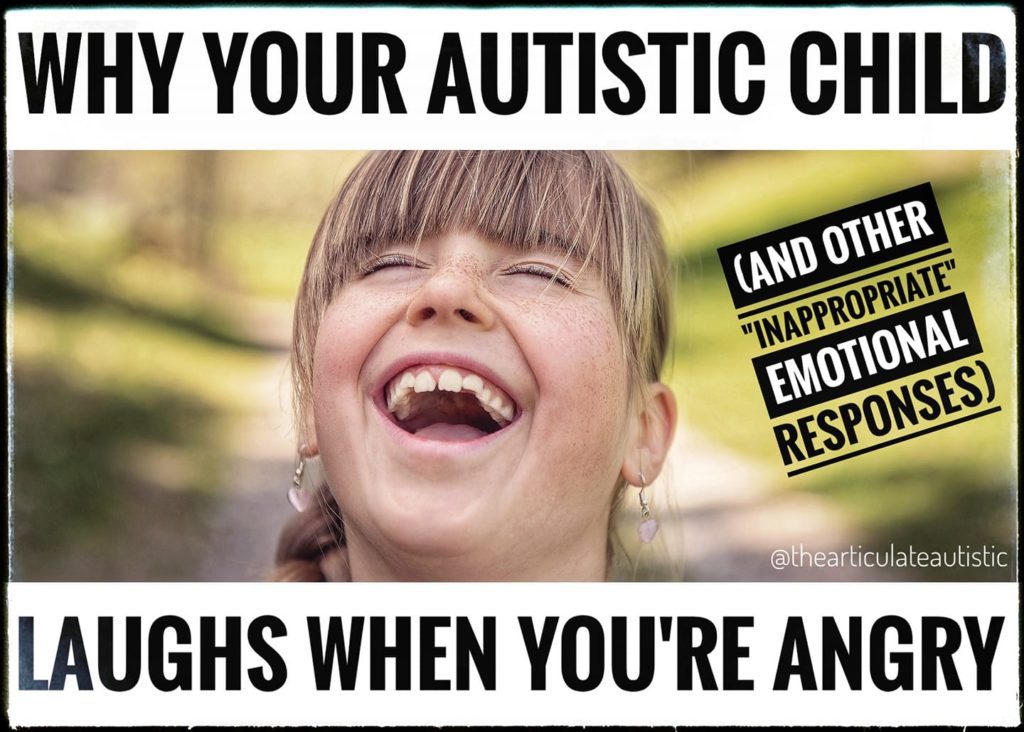
If you are the parent of an autistic or otherwise neurodiverse child, you may have felt laughed at and completely disregarded by them, and this may have caused you to become angry, punish them, ground them, accuse them of being disrespectful, etc.
Let me offer you another perspective on this.
Could your child be being disrespectful? Maybe. Could it be something else entirely? Most likely.
When I was a child, teen, and young adult, I would get in SO much trouble for having what was deemed “inappropriate” emotional responses to facial expressions.
I can only speak for myself in this case, but some angry faces (not all) looked entirely exaggerated and comical to me.
It was like watching a clown pull a face to purposefully make me laugh. I didn’t take it seriously because I truly believed the person was kidding around!
One, my angry face looks different from what I’ve seen from most others. Two, I wasn’t able to connect my behavior to their response, so I certainly didn’t expect anger, so, for me, it came out of nowhere…so, it had to be some sort of joke, right?
It was all very puzzling and traumatic for me considering how I was treated for laughing at an angry expression.
Also, autistic adults and children alike often have “inappropriate” emotional responses to facial expressions, tone of voice, and body language because we’re often taking a stab in the dark (guessing) as to what they mean, especially if we’ve never encountered a certain set of circumstances before.
But, see, it’s often not the “inappropriate” autistic response that causes a major meltdown or otherwise traumatizing situation; it’s the neurotypical person’s mistaken belief that that behavior is malicious PLUS the accompanying response to said belief that does the most damage.
Tip for the next time this happens: Be vocal about your feelings and explain why you are feeling that way. Be very specific.
For example, “I’m angry right now because you took your little brother’s stuffed animal away from him. He loves that little toy elephant like you love model airplanes, and he feels lost without it. It really hurts his feelings.”
Your child may surprise you and say, “Well, his plastic eye was falling off, Mommy, and I didn’t want him to swallow it, so I was bringing it to you to fix.”
Or, if your child is non-verbal, they may just repeatedly point at the eye that’s falling out while murmuring in distress.
Imagine if your angry face made your autistic child laugh or have another response you deemed offensive, and it caused you to lash out before you fully understood the situation? Can you imagine the trauma and confusion your autistic child would face since they were actually doing a very good and responsible thing?
Always ask. Always explain. Give the benefit of the doubt.
If you’re too emotional at that moment, ensure the immediate safety of everyone involved, and walk away until you feel calmer.
The best way to improve communication with your autistic loved one is to understand how your autistic loved one’s mind works! Intentions, motivations, and personal expressions (facial expressions or lack thereof, body language, etc.), are often quite different in autistic people than they are in neurotypical people.
Experience a better understanding of your autistic loved one by reading books about life from an autistic perspective as well as stories that feature autistic characters. You’ll have so many “Ah ha!” moments and start seeing your autistic loved one in a different light (and you’ll have a better understanding of their behaviors, which you may have been misinterpreting up until now).
Books I recommend for a better understanding of your autistic loved one:
Follow me on Instagram.
Want downloadable, PDF-format copies of these blog posts to print and use with your loved ones or small class? Click here to become a Patreon supporter!

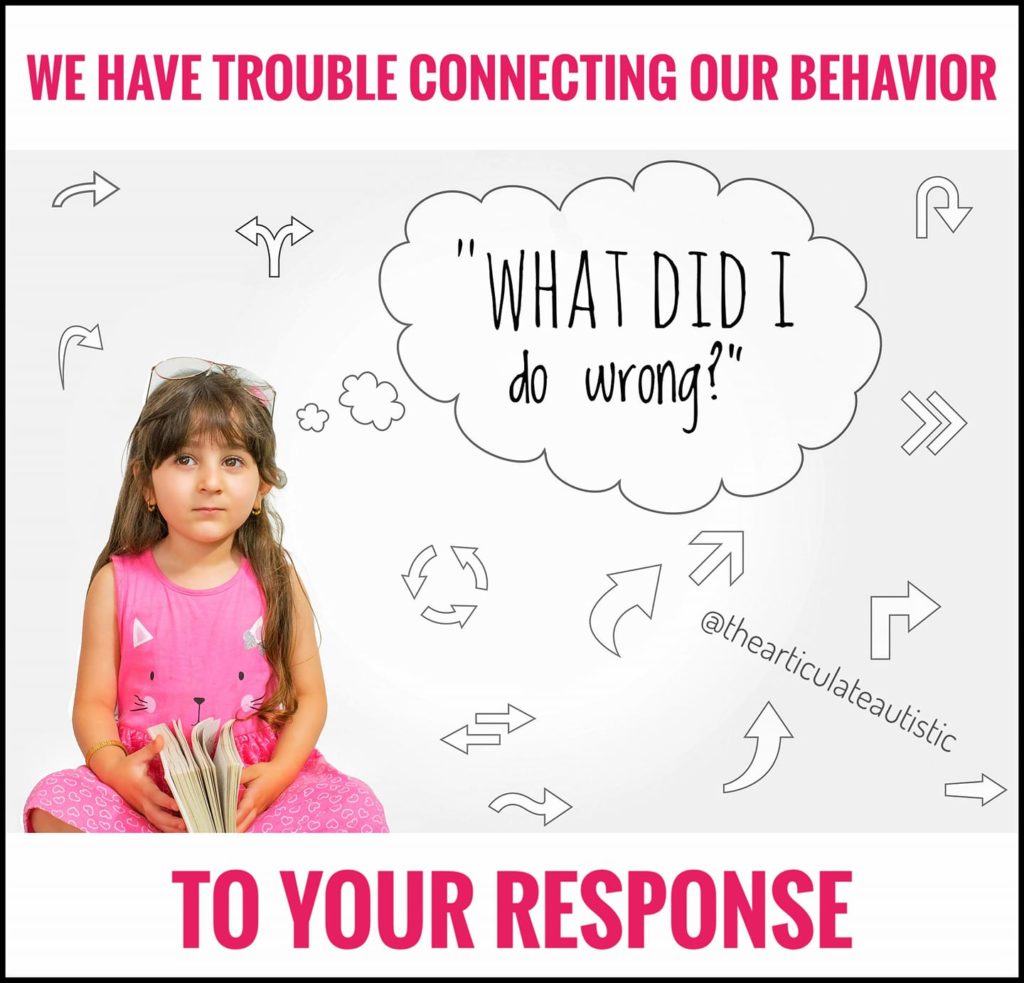
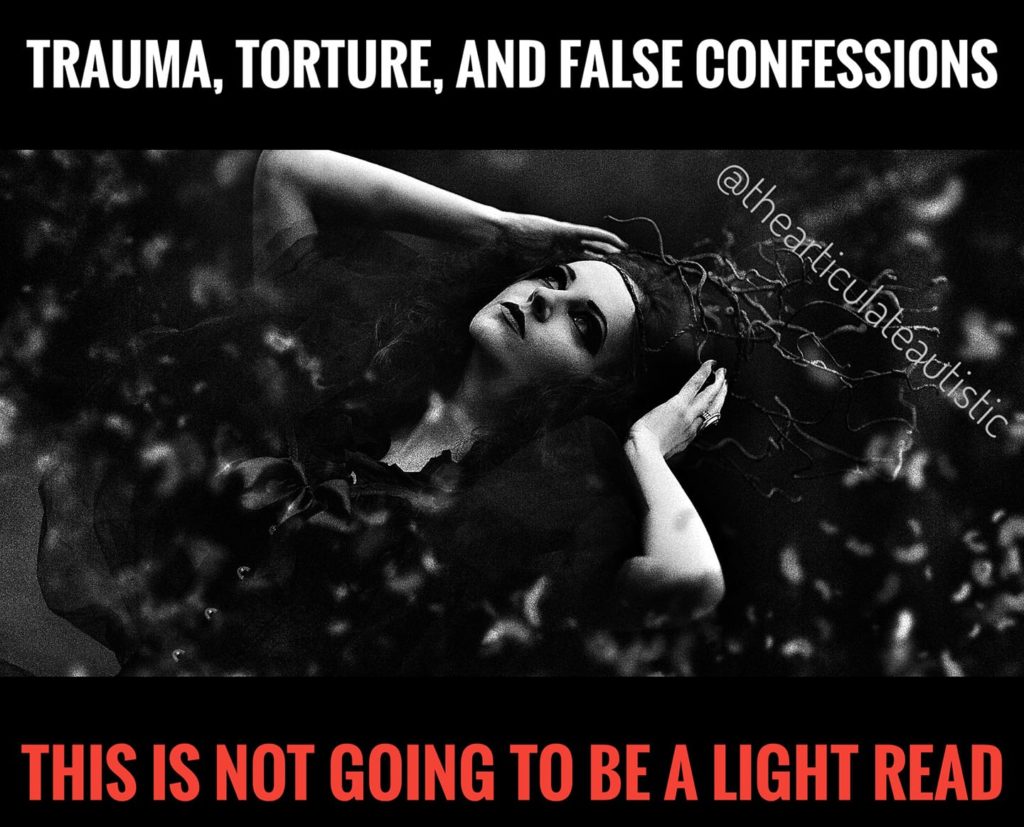
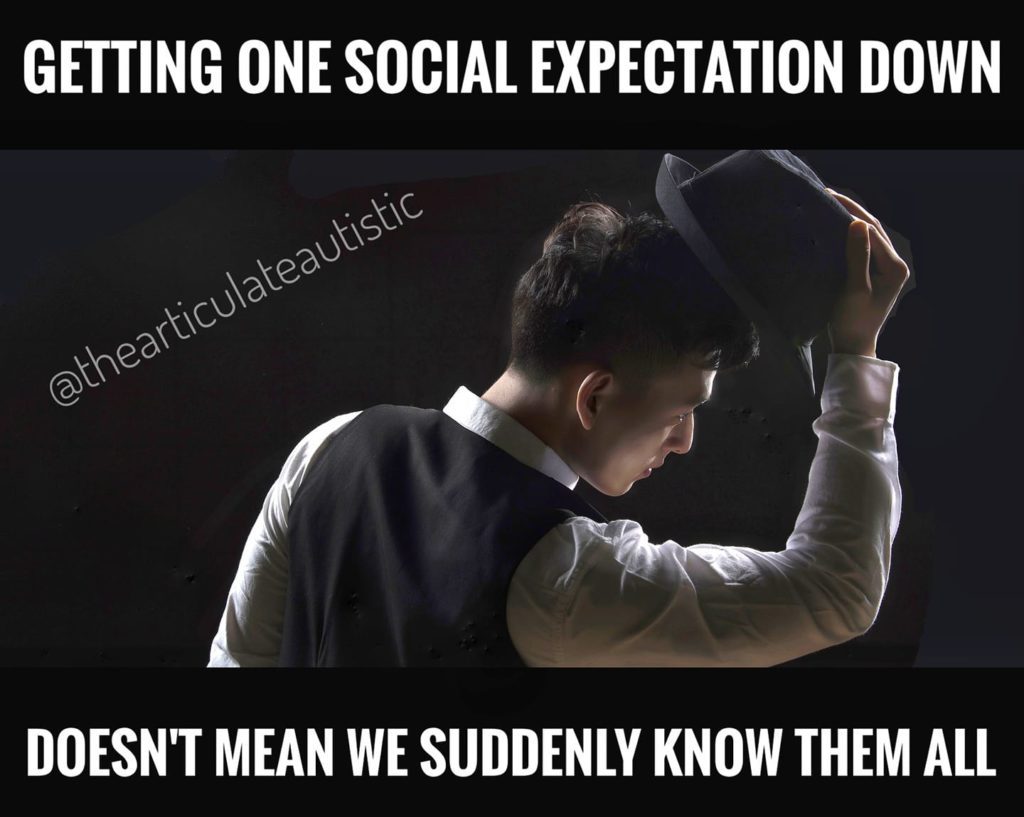
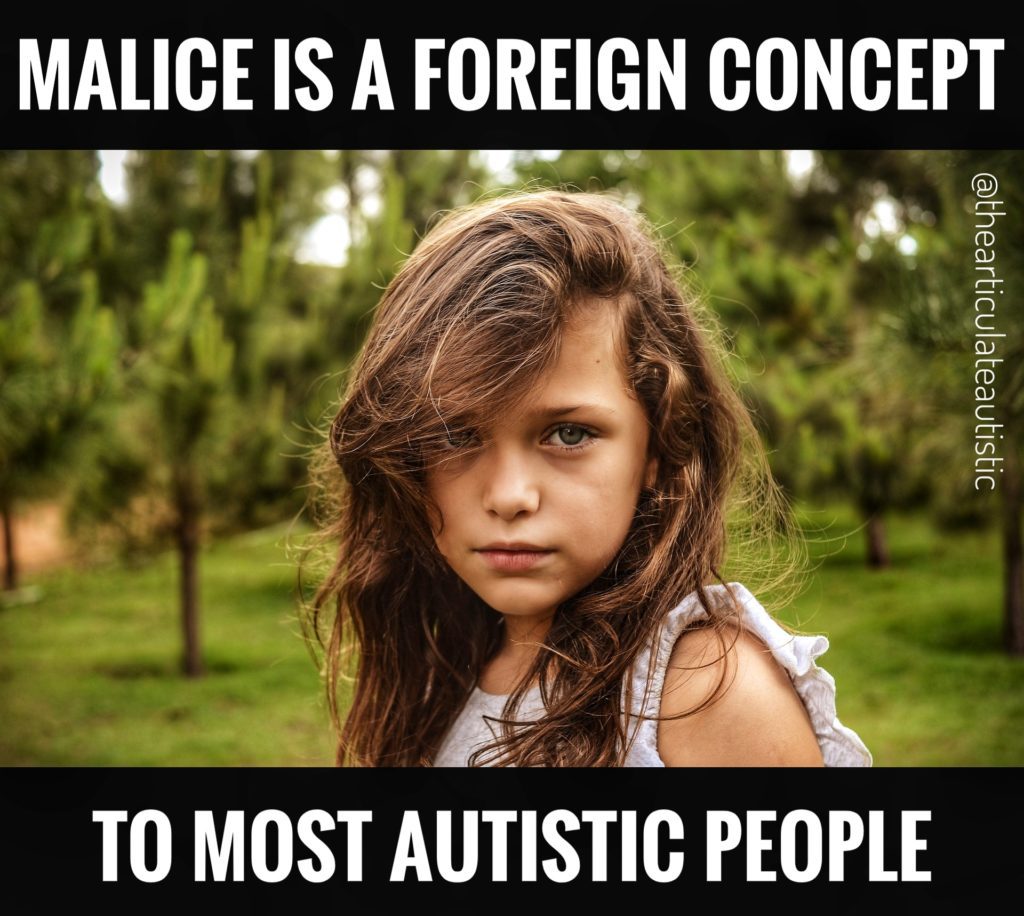
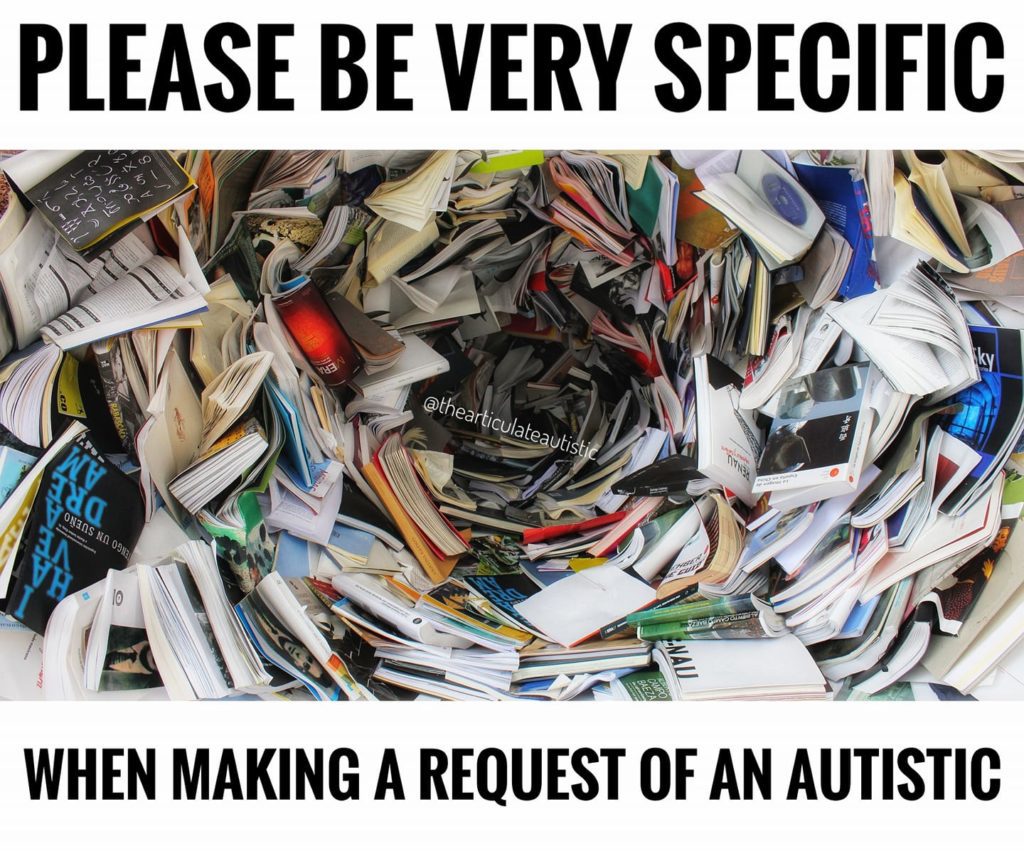
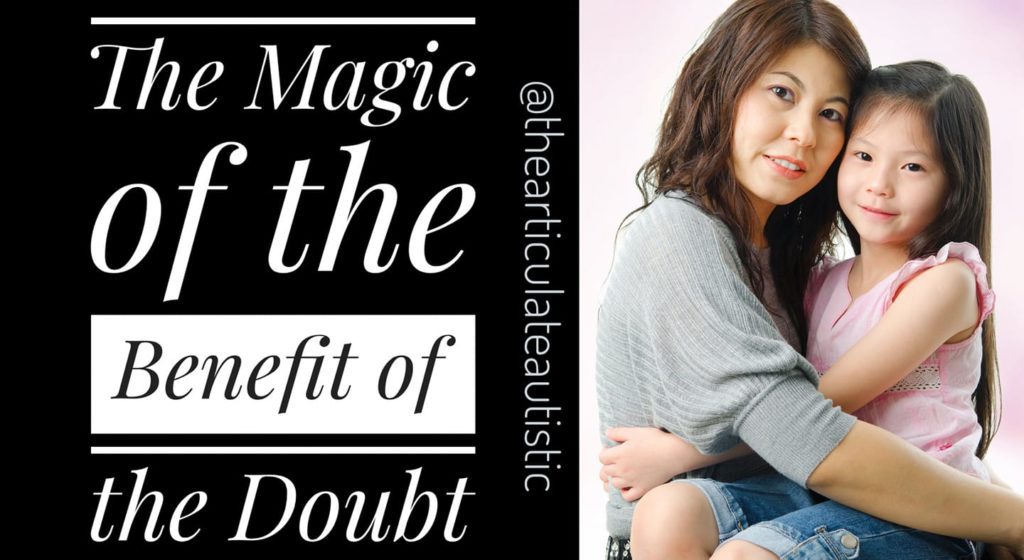


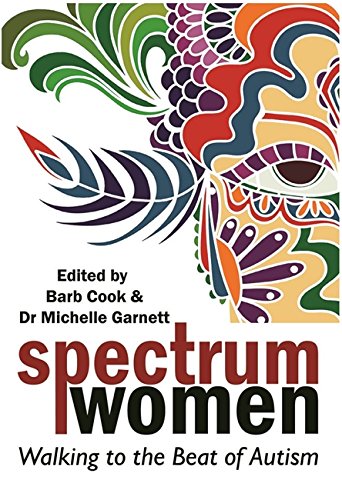



Well written piece, Jaime. I’m an old guy with ADHD and traces of autism and Asperger’s. I was diagnosed at 53 when my 15 year old daughter received her diagnosis.
My then wife blew up and blamed me for a galaxy of perceived stuff ups and offences.
Divorced.
Later I repartnered with a woman who was massively kind and understanding. She has a son – then 8, now 24 and although she was unaware that he is autistic then, she had adapted to his neurodivergent behaviour.
To reinforce your point about inappropriate behaviour – a story. At junior school the class had a trip to the local community swimming pool. The teacher told the class not to jump into the water until she said it was ok. Our sun jumped into the water.
When she fished him out, dripping wet, she asked him why he jumped in when she had specifically said not to.
A plausible response would have been “Sorry, Miss, I didn’t hear you”.
His response, despite the evidence to the contrary, was “I didn’t”.
It took me ages to think through this seeming madness. I think the unspoken response was “I didn’t jump in. I stepped in”. Which explains it, but as I’m sure you know we neurodivergent people often wait until we see what other people are doing – and copy that.
Thank you for the post and for the opportunity to respond.
Kind regards, Mike.
And people probably thought your son was being sarcastic. Thank you for sharing this story. 🙂
November 8th 2022 p.m. I am 65 years old and as a child I would laugh if someone were crying such as when loved ones died or got hurt I think I read about this behavior in the book autism freaks geeks etc but I thought I was alone with this behavior I may do this also at the age of 65 perhaps giggle inappropriately laugh inappropriately scream and yell on the telephone to my sister’s another family and friends if I am angry please help me ASAP
Hello, Jane. Thank you for sharing your experience. What you’re going through could be related to alexithymia, which is the inability to understand and express one’s own emotions.
Thank you for your article. I have a 5 year old, non-verbal autistic son. I love him so much and am eager to accept and encourage him to be himself, but my greatest difficulty is that he is very aggressive, hitting me, pulling my hair, trying to shove toys down my shirts, throwing things, smashing things and laughing the entire time.
If I gently hold his hands to stop the hitting/destruction he becomes distressed and cries. When I let his hands go, he is back to assaulting me again. If I leave the room, he is also upset and cries because he doesn’t want to be alone. I want so badly to give him the attention he needs and to play with him but he hurts me so much, that sometimes I am scared people will see my bruises and think my husband hits me. I am also just scared in general. I have developed a noticable flinch at any sudden movement near me because I always feel now like I am about to hit or kicked or attacked at any moment. I never feel calm or safe anymore. I even started having nightmares about it.
How can I gently discourage my son’s aggression while spending time with him and making sure he knows I’m not mad and still love him so much?
I’m really sorry you’re going through this. I’m going to send you an email. (I hope this is your email, it’s a cute one, btw.)
Hello, I am AuDHD and have the same question about aggression with regards to my Autistic 4 year old. Today, he hit me a bunch of times in the head. Usually, I will grab his hands and tell him I cannot allow you to hit me. This time, I didn’t because I wanted to see if he would respond to my ouch you’re hurting Mommy, it really hurts. He did not. He just kept doing it and laughing when I said it’s hurting me. Then when I got up and walked away because I needed space between us, that just made him more upset and crying.
I needed to eat. We were playing in the backyard and I gave him ample time warnings before I went to eat. It’s like this all day long and he will not let me do the self care that I need to do for myself. Email me too?
Sending you an email. 🙂
We are at a loss with our 7 year old autistic son. He’s has always liked banging things, unsure if he likes the feel or the sound. When he’s having a meltdown, he tends to try to hit his head. When we try to stop him he seems to like being restrained. During meltdowns he hits himself and others. When he’s not having meltdown, he hits almost like he likes the sensation (but we can’t get him to redirect the hitting to something else). He laughs when my wife cries and laughs while hitting. We are at a loss. Some of it with the meltdowns appears to be communication breakdown, but other times it’s like he doesn’t understand he is hurting others and even if he did, I’m not sure he would care. We have tried social stories, weighted blankets, chewies, etc. we recently had another baby and are scared that he is going to hit her. Any insight?
I’m going to send you an email.
My heart is hurting tonight, as our 13 year old son; once again attacked me. This time it was multiple pinches with his nails and breaking of skin, as he was cackling and laughing saying over and over again “I hurt you. That’s what you get.” I’m so tired, of being the target as his mother. All I could do was remove him from the current situation and put him in a quiet spot, while backing away from him to remain calm. Deep inside I feel broken as this isn’t the first time, nor the last time this will happen. He relies on me for everything, and is low functioning. Still in pull ups at the age of 13, and he’s at a kindergarten level at most. While I don’t have expectations of where he should be regarding everything else, as I know some things he can’t help. The abuse is a big one, I just can’t handle anymore. I suffered in silence for years, since he was two years old with this behavior. I’ve tried everything I can think of, and anything recommended to me; apart from getting him on medication. Because no provider/doctor has recommended it thus far. He isn’t diagnosed, so very few are taking me seriously when I say that he has autism. Mainly because they say he makes eye contact and doesn’t fit the autism description.
Oh, my goodness! I’m so sorry this is happening in your home and that your/his doctor isn’t taking you, him, or his diagnosis seriously. That’s terrible! I’d like to help. I’m going to send you an email.